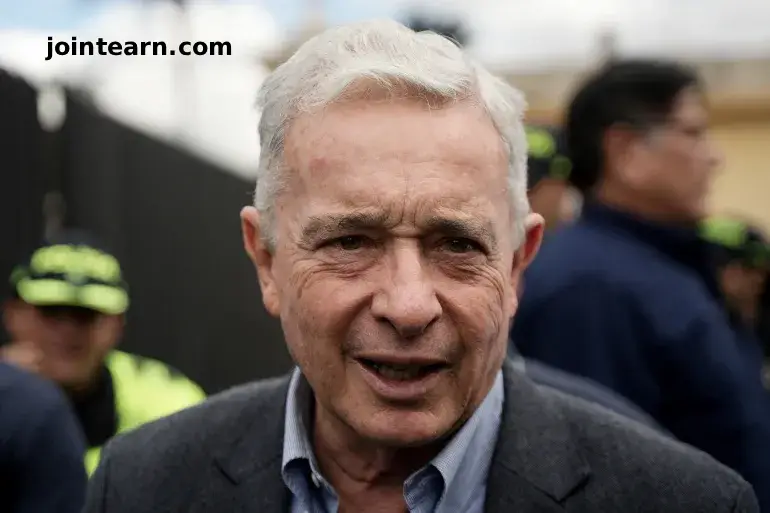
A Colombian appeals court has overturned the fraud and bribery convictions of former President Alvaro Uribe, marking a major turning point in one of the most consequential legal battles in the country’s modern history. The decision — made by a two-to-one majority — found “structural deficiencies” and insufficient evidence in the original ruling that had sentenced Uribe to 12 years of house arrest.
The verdict reignites Colombia’s deep political divisions, pitting supporters of Uribe’s right-wing legacy against critics who accuse him of long-standing ties to paramilitary groups and human rights abuses.
Court Nullifies Conviction Over ‘Procedural Flaws’
Uribe, who served as Colombia’s president from 2002 to 2010, was previously convicted of witness tampering and bribery in July 2025. Prosecutors alleged that Uribe had pressured paramilitary members to deny their connections to him.
However, on Tuesday, a panel of magistrates overturned the ruling, stating that the evidence presented by the prosecution did not meet the threshold of credibility and consistency required for conviction.
Uribe, who has long maintained his innocence, celebrated the ruling as “a victory for justice and truth,” while his critics described it as a “setback for accountability and democracy.”
Petro Condemns Ruling as ‘Historical Cover-Up’
Current Colombian President Gustavo Petro — the country’s first left-wing leader — sharply criticised the court’s decision.
“This is how the history of paramilitary governance in Colombia is covered up,” Petro said on X. “The politicians who came to power through drug trafficking and unleashed genocide are once again shielded from justice.”
Petro has frequently accused Colombia’s judicial institutions of favouring conservative elites, arguing that the ruling reinforces impunity for right-wing paramilitary crimes during Uribe’s presidency.
Senator Cepeda to Appeal Before Supreme Court
Senator Iván Cepeda, a key figure in bringing the case against Uribe, announced plans to appeal the decision before the Supreme Court of Justice.
“We will file an appeal for cassation,” Cepeda stated, adding that the victims deserve “a complete and fair review of the evidence.”
Cepeda initially launched investigations into Uribe’s alleged ties to paramilitary groups like Bloque Metro, which operated in the Antioquia region in the 1990s. Uribe retaliated by accusing Cepeda of fabricating testimonies — a move that backfired when the Supreme Court in 2018 ordered an inquiry into Uribe himself for alleged witness manipulation.
Background: Uribe’s Paramilitary Allegations
Uribe remains one of the most polarising figures in Colombia. While many credit him with leading a military offensive that weakened the FARC rebel group, human rights organisations have accused his administration of turning a blind eye to extrajudicial killings and massacres committed by paramilitary allies.
During his presidency, thousands of civilians were allegedly murdered by soldiers and falsely presented as rebel combatants — a scandal widely known as the “false positives” case. Uribe has repeatedly denied any role, insisting he fought to protect Colombia from insurgent and criminal threats.
His connections to right-wing paramilitaries date back to his early political career, when critics claimed that some of his political rise in Antioquia was supported by narco-paramilitary networks.
Impact on Colombia’s 2026 Election
The appeals court ruling could significantly reshape Colombia’s 2026 presidential election. Uribe remains a central figure in Colombian politics, and his party, Democratic Center, has hinted that he may run for Senate again if legally permitted.
The decision also injects new momentum into the right-wing bloc ahead of the elections, while left-wing groups fear that justice for victims of paramilitary violence is being eroded.
Al Jazeera’s correspondent Alessandro Rampietti reported from Bogotá that the ruling will have “major repercussions” for Colombia’s political landscape.
“We can expect the victims to appeal to the Supreme Court, and it may take years before a final verdict is reached,” Rampietti noted.
International Reactions: Trump and Rubio Defend Uribe
The case has also drawn attention from Washington, particularly from right-wing leaders sympathetic to Uribe. US President Donald Trump and Secretary of State Marco Rubio have defended the former Colombian president, calling him a victim of judicial persecution.
“Uribe’s only crime has been defending his homeland,” Rubio wrote earlier this year, denouncing what he called the “weaponisation of Colombia’s courts.”
Petro has clashed with Trump’s administration over tariff policies and drug enforcement strategies, accusing the US of undermining Colombia’s sovereignty. He also warned that the Uribe acquittal could open the door for Trump to strengthen alliances with conservative factions in Colombia ahead of the 2026 elections.
A Deeply Divided Nation
The controversy surrounding Uribe underscores Colombia’s enduring political divide — one shaped by decades of civil conflict, narcotrafficking, and polarised justice.
While Uribe’s supporters view him as a national hero who restored security, his detractors see him as a symbol of impunity for the elite.
The case now moves to the Supreme Court, which could take up to five years to deliver a final judgment. For now, Uribe walks free, but Colombia’s struggle to reconcile justice with political power remains far from over.


Leave a Reply